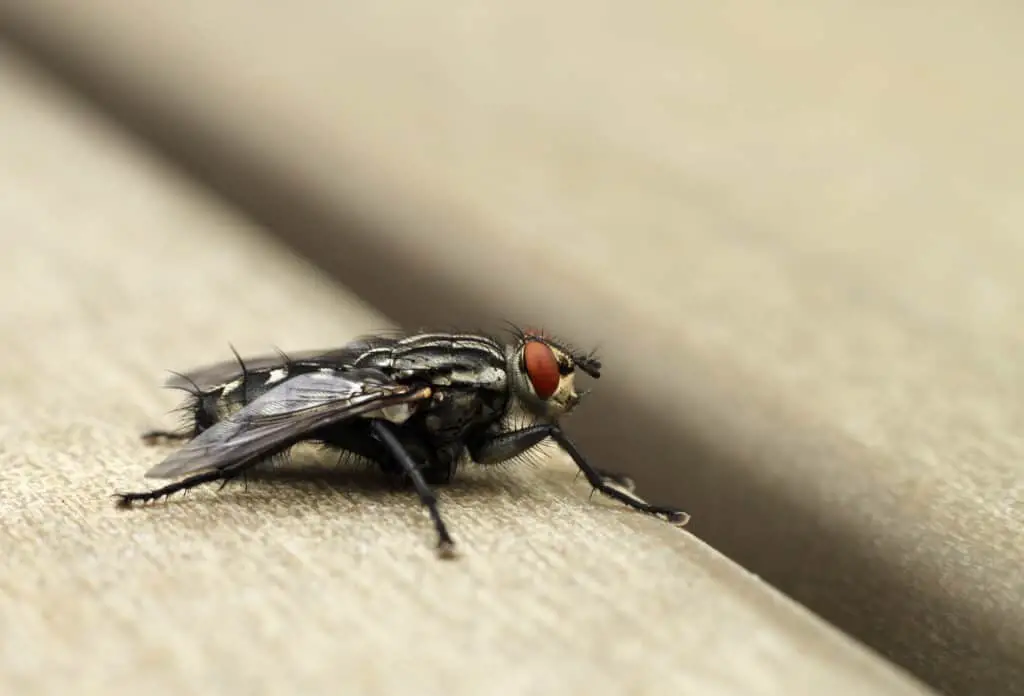Have you ever sat outside on a warm summer day only to find yourself swarmed by flies buzzing around your head?
It’s an all-too-common annoyance many of us have faced, but there’s a lot more to these pesky insects than just being a nuisance. Understanding the reasons why flies are so attracted to humans can help us better deal with their presence and perhaps even prevent them from ruining our outdoor enjoyment.
Quick Answer:
Flies buzz around heads due to attraction to human odors, including sweat, carbon dioxide, and hair product scents. They are also drawn to heat and humidity. The “buzzing” sound is caused by the rapid fluttering of their wings.
Reasons for Flies Buzzing Around Your Head
Attraction to Carbon Dioxide and Heat
Flies are attracted to the carbon dioxide (CO2) and heat emitted by humans. When you breathe, you exhale CO2, which flies detect and use to locate their next meal or resting place. Additionally, the heat produced by your body, particularly your head, provides a cozy environment for flies.
Lured by Odor and Natural Oils
Odors and natural oils emitted by our body also contribute to attracting flies. The human scalp produces oils known as sebum, which can have a slightly sweet odor. This scent, combined with the odors produced by sweat, makes your head a tempting target for flies in search of a meal or a place to rest.
Desire for Moisture, Salts, and Proteins
Our body emits moisture, salts, and proteins through sweat, tears, and skin flakes. Flies need these essential nutrients to survive, so they are drawn to areas where they can access them. Your head provides a rich source of these elements, making it an inviting spot for flies to buzz around and feed.
Types of Flies That Buzz Around Heads
House Flies and Fruit Flies
House flies are common indoor pests that can often be found buzzing around heads. Their agile flight and persistent presence make them quite a nuisance. These flies are attracted to odors associated with humans, such as sweat. They can carry various pathogens; hence, it is essential to keep them at bay.
Fruit flies, on the other hand, are smaller than house flies and are drawn to fermenting fruits and vegetables. Although they may not be found directly around your head, they are still annoying, especially during warm months when your kitchen might be stocked with ripe produce.
Mosquitoes
Mosquitoes are notorious for their relentless buzzing sounds, which are a result of their wings vibrating rapidly. Their primary motive for buzzing around human heads is to obtain a blood meal.
The heat and carbon dioxide emitted by humans attract these bloodsuckers. Mosquitoes are carriers of various diseases, making them a significant health concern.
Gnats
Gnats are tiny flying insects often seen in swarms near water sources and moist environments. They are attracted to carbon dioxide, making them prone to buzz around people’s heads.
Some species of gnats are known to bite, while others are merely irritating. Even though they don’t pose significant health risks, their buzzing can be a source of frustration and discomfort.
Fly-Borne Illnesses and Infections

Pink Eye and Eye Infections
Flies may carry bacteria and viruses that can cause pink eye (conjunctivitis) and other eye infections. When flies come into contact with your eyes, they can transfer these pathogens, leading to irritation, discomfort, and sometimes more severe symptoms.
To reduce the risk of contracting pink eye or other eye infections, it’s important to:
- Keep your living and working areas clean and free of flies
- Avoid touching your eyes, especially with dirty hands
- Use insect repellents or screens to keep flies away
Bad Breath and Oral Infections
Another common issue associated with flies is bad breath. Flies can harbor various bacteria that cause bad breath and oral infections.
When flies come into contact with your food or mouth, they can spread these pathogens. Here are some precautions you can take to minimize the risk of developing bad breath and oral infections caused by flies:
- Store food properly and ensure it is covered
- Maintain good oral hygiene by brushing, flossing, and using mouthwash
- Use fly traps or repellents to keep flies away from your living and eating spaces
Preventing Flies from Buzzing Around Your Head
Proper Pest Control and Sanitation
To prevent flies from buzzing around your head, start by maintaining a clean home and practicing proper pest control. Keep your living space tidy and free of leftover food crumbs or spills, as these attract flies.
Regularly empty and clean garbage bins, as the smell of trash entices these insects. Ensuring proper sanitation can significantly reduce the number of flies around you.
Using Insect Repellent
Insect repellents can be very effective in keeping flies away. Apply a repellent containing DEET, picaridin, or oil of lemon eucalyptus on exposed skin, avoiding sensitive areas like your eyes and ears. You can also use repellent sprays or devices around your home to deter flies from entering your living spaces.
Wearing Appropriate Clothing
Wearing appropriate clothing can reduce the risk of flies buzzing around your head. Opt for long-sleeved shirts and pants to cover exposed skin, which can attract flies. Light-colored clothing is also preferable, as dark or bright colors tend to attract these insects.
Eliminating Food and Garbage Odors
Flies are attracted to the smell of food and garbage, so managing these odors is crucial. Here’s a list of measures to keep odors in check:
- Store food properly: Keep food sealed in airtight containers.
- Clean up after meals: Promptly clean up spills and crumbs to avoid attracting flies.
- Dispose of garbage promptly: Empty trash bins regularly and ensure the lids are tightly sealed.
- Clean garbage cans: Wash your garbage cans with soap and water to remove lingering odors.
Dealing with Indoor Fly Problems

Detecting and Eliminating Infestations
To deal with indoor fly problems, it is essential to first detect and eliminate any infestations. Look for areas that might be attracting flies, such as uncovered trash or accumulated food debris.
Regularly clean surfaces, dispose of trash and keep food containers sealed to minimize infestation potential. Inspect your home for entry points that could allow flies access indoors, such as torn screens or gaps around windows and doors, and seal or repair them as needed.
Keep an eye out for fly larvae or maggots, which are indications of a larger infestation. These could be found in garbage cans, compost heaps, or damp, decaying organic materials. Removing breeding sites by cleaning and disposing of these materials will help to address the root cause of the infestation.
Deter and Kill Flies Effectively
Once you have addressed any infestations, take proactive steps to deter and kill flies before they become a problem.
Here are some effective strategies to implement:
- Use screens and barriers: Installing window and door screens will help keep flies out of your home. Be sure to keep doors and windows closed when not in use.
- Natural deterrents: Certain plants, such as basil, lavender, and lemon balm, are known to repel flies. Place these plants near entrances and windows to deter flies from entering your home.
- DIY fly traps: Create homemade fly traps using easy-to-find materials, such as a mixture of apple cider vinegar and dish soap in a container. Flies will be attracted to the scent and then become trapped in the solution.
- Fly swatters and electrocution traps: A classic fly swatter or an electric fly trap can be effective in killing flies as soon as they appear indoors.
Conclusion
Flies buzzing around our heads can be both annoying and perplexing.
Ultimately, they are just trying to survive, and our presence provides a variety of resources for them. We emit carbon dioxide and warmth, both of which attract flies.
In addition, our bodies host potential sources of food, such as sweat, skin cells, and even our hair.


